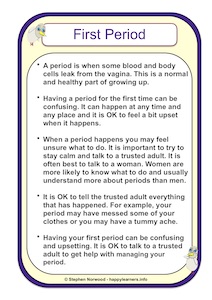Facts About Periods
A period is a discharge of blood and body cells from the vagina. The medical name for a period is menstruation.
Having a period is very normal for females. It is part of the menstrual cycle that keeps the uterus (womb) healthy. This also means that a woman could become pregnant (have a baby) if they have sex with a man.
Periods usually happen about once a month though this can vary a lot. Each period usually lasts about three or four days. Sometimes it can be longer or shorter than this.
The age when girls start having their first periods is usually sometime between the age of 11 and 15 years old. A few girls may start earlier or later than this.
Sometimes a period can cause an uncomfortable feeling in the tummy. This can happen before the period starts. Sometimes taking paracetamol can help with this discomfort.
There are a range of feminine hygiene products that can be bought to help manage periods.
First Period
A period is when some blood and body cells leak from the vagina. This is a normal and healthy part of growing up.
Having a period for the first time can be confusing. It can happen at any time and any place and it is OK to feel a bit upset when it happens.
When a period happens you may feel unsure what to do. It is important to try to stay calm and talk to a trusted adult. It is often best to talk to a woman. Women are more likely to know what to do and usually understand more about periods than men.
It is OK to tell the trusted adult everything that has happened. For example, your period may have messed some of your clothes or you may have a tummy ache.
Having your first period can be confusing and upsetting. It is OK to talk to a trusted adult to get help with managing your period.
Spotting
Spotting is tiny bleeding from your vagina when it is not your period.
Most girls and women will experience some spotting at some time. Some will have it regularly whilst others rarely.
Spotting can happen for lots of reasons. It is usually nothing to worry about but it can be useful to talk to a parent or other trusted adult about it. It can also be useful to make a note of the date when spotting happens.
If you get a lot of spotting then it often worth talking to your doctor. They can make sure that you are OK.
Girls and women who have a lot of spotting sometimes wear a panty liner to protect their underwear.
Spotting happens for lots of reasons and is generally OK. If it happens more than once or twice it is useful to get advice from your doctor.
Talking About Your Period
Talking about your period is healthy and normal but there are some social rules.
Talking about periods can be a taboo subject. This means that many people do not want to hear you talk about your period. It can still be OK to talk about your period but it is usually best to have a good reason. If you want to talk about your periods it is usually best to speak to a close friend, trusted adult or other people who can help you.
When you need help because of your period it is important to talk to someone straight away. It is often best to speak in a quiet voice so that other people do not hear.
When you want to chat about your period it is often best to wait until you can have a private conversation.
Talking about your period is sometimes OK and sometimes not OK. It is always OK if you need help. It is also usually OK to talk about your period to a friend or trusted adult in a quiet and private place.






